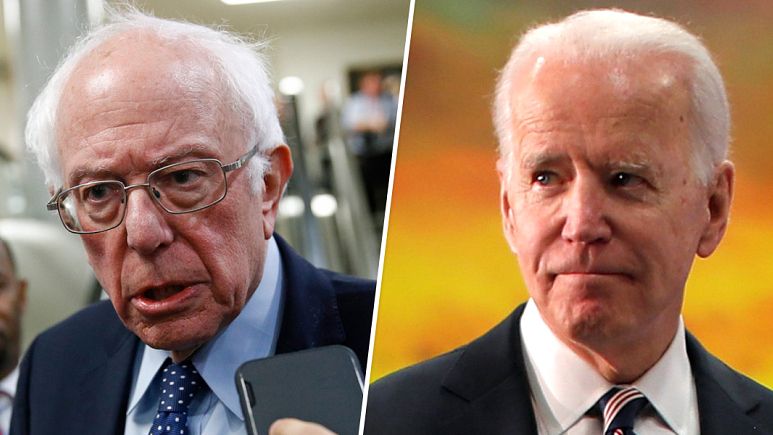Sanders, Biden are neck-and-neck in new NBC/WSJ national poll

DES MOINES, Iowa — Just days before the first votes are counted in the Democratic primary, a new NBC News/Wall Street Journal national poll finds Vermont Sen. Bernie Sanders and former Vice President Joe Biden statistically tied at the top of the Democratic field.
Sanders gets 27 percent support from Democratic primary voters around the country, while Biden gets 26 percent. Sanders' single-point advantage, while well within the poll's /- 4.74 percentage point margin of error, marks his first lead of the primary in the NBC/WSJ survey.
Massachusetts Sen. Elizabeth Warren is the only other Democrat registering in double digits, at 15 percent, while former New York City mayor Michael Bloomberg now holds the fourth place spot, at 9 percent. Former South Bend mayor Pete Buttigieg gets 7 percent support in the poll; Minnesota Sen. Amy Klobuchar has 5 percent, and businessman Andrew Yang stands at 4 percent. No other candidate has 3 percent support or more.
#embed-20200130-polls-sanders-biden iframe {width: 1px;min-width: 100%}
The new survey marks a six-point gain for Sanders since last month. In the December NBC/WSJ poll, Biden led the field with 28 percent, with Sanders at 21 percent, Warren at 18 percent and Bloomberg at 4 percent.
The two co-frontrunners' coalitions continue to split Democratic voters along sharp racial and generational lines, and the supporters backing each of them have starkly different views of capitalism and socialism.
But Sanders' most powerful advantage may be the loyalty of his backers. Sixty percent of his supporters say they will definitely vote for him, while 48 percent say the same for Biden.
And despite worries that Sanders' progressive politics might make him completely unpalatable to the Democratic Party's centrists and potential swing voters, just 12 percent of Democratic primary voters say they are "very uncomfortable" with his candidacy, a share that's statistically comparable to those who say the same of his rivals.
"Four years ago, Republicans thought it was unfathomable at this stage that Donald Trump could be the party's nominee," said Democratic pollster Peter Hart, who conducted the survey along with Republican pollster Bill McInturff. "The Democrats should not make that mistake. Bernie Sanders is formidable and that's what we've learned in this survey."
While Sanders has an edge on the enthusiasm scale, Biden may have room for growth if he remains near the top of a winnowing Democratic field after the coming contests in Iowa and New Hampshire.
More voters choose him as their second choice candidate (20 percent) than choose Sanders (15 percent), although Warren bests both with 23 percent second-choice support.
While equal shares of Democratic voters overall say they are either "comfortable with" or "enthusiastic about" Biden (70 percent) and Sanders (69 percent), those who have similarly warm feelings toward Buttigieg, Klobuchar or Bloomberg all express more comfort with Biden than with Sanders.
And Biden has an edge among the almost seven-in-ten Democratic voters who say that one of their top priorities in choosing a candidate is his or her ability to beat President Donald Trump. Among those voters, Biden leads the field with 32 percent, compared with 21 percent for Sanders.
Two top candidates, two coalitions
The survey confirms that Sanders continues to anchor his candidacy around younger and more liberal voters, while Biden's coalition is founded on support from older voters and African-Americans, who back the former vice president by a margin of almost 2-1.
But perhaps most striking is the split in how each candidate's supporters view capitalism and socialism.
#embed-20200130-polls-sanders-biden-split iframe {width: 1px;min-width: 100%}
Among Sanders supporters, just 12 percent have a positive view of capitalism, while 48 percent have a negative one. But a majority — 60 percent — view socialism positively, while just 4 percent disagree, a net positive rating of 56 percentage points.
Sanders describes himself as a democratic socialist, while his primary rivals have mostly shied away from that label.
Biden's backers, on the other hand, are generally fairly positive towards capitalism, with 40 percent viewing it favorably and 26 percent viewing it negatively. But more of his supporters give socialism a thumbs down (35 percent) than a thumbs up (31 percent), yielding a net negative rating of 4 percentage points.
Among all Democratic primary voters overall, socialism is viewed favorably by 40 percent and negatively by 23 percent, while the remaining 34 percent say they're neutral or unsure.
Those more favorable towards socialism are also far more likely to be younger, a correlation that is reflected in the dramatic differences in the ages of Biden and Sanders supporters.
Sanders gets 47 percent support among Democratic primary voters under 35, compared with just 8 percent for Biden. Among those over 50, Biden gets 37 percent support compared with just 12 percent for Sanders.
Bloomberg's ads give him a boost
The survey also shows that Bloomberg, whose massive personal wealth and late entry into the race have the potential to shake up its dynamics right as voting gets underway, has dominated the field when it comes to flooding the broadcast airwaves.
Bloomberg has spent more than $230 million on TV and radio ads to date, and almost six-in-ten Democratic voters nationwide say they have seen one of his advertisements.
And that appears to be having at least some positive impact on their views of him.
Last month, 52 percent of Democratic primary voters said they had reservations or were uncomfortable with his candidacy, while just 31 percent were comfortable or enthusiastic about it.
Now, Democrats' perceptions of his run are breaking even, with 45 percent expressing concerns and 45 percent saying they're at least comfortable with his candidacy.
The NBC News/Wall Street Journal poll of 428 Democratic primary voters was conducted January 26-29, 2020. It has a margin of error of /- 4.74 percentage points.